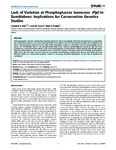Lack of Variation at Phosphoglucose Isomerase (Pgi) in Bumblebees: Implications for Conservation Genetics Studies
| dc.contributor.author | Ellis, Jonathan | |
| dc.contributor.author | Turner, Lucy | |
| dc.contributor.author | Knight, Mairi | |
| dc.date.accessioned | 2018-08-13T14:38:15Z | |
| dc.date.available | 2018-08-13T14:38:15Z | |
| dc.date.issued | 2013-06-04 | |
| dc.identifier.issn | 1932-6203 | |
| dc.identifier.issn | 1932-6203 | |
| dc.identifier.other | ARTN e65600 | |
| dc.identifier.uri | http://hdl.handle.net/10026.1/12104 | |
| dc.description.abstract |
Assessing genetic variation underlying ecologically important traits is increasingly of interest and importance in population and conservation genetics. For some groups generally useful markers exist for examining the relative role of selection and drift in shaping genetic diversity e.g. the major histocompatibility complex in vertebrates and self-incompatibility loci in plants. For invertebrates there is no such generally useful locus. However, phosphoglucose isomerase (Pgi) has been proposed as a useful functional marker in the conservation genetics of invertebrates. Where thermal microclimate varies, balanced polymorphisms may be maintained due to trade-offs between thermally stable and kinetically advantageous allelic forms. We here report very low levels of Pgi variation in bumblebees rendering this locus to be of little use as an adaptive marker in a conservation genetics context in this group. Potential explanations for this lack of variation are considered. | |
| dc.format.extent | 1-11 | |
| dc.format.medium | Electronic-Print | |
| dc.language | en | |
| dc.language.iso | en | |
| dc.publisher | Public Library of Science (PLoS) | |
| dc.subject | Amino Acid Substitution | |
| dc.subject | Animals | |
| dc.subject | Bees | |
| dc.subject | Conservation of Natural Resources | |
| dc.subject | Genetic Loci | |
| dc.subject | Genetic Variation | |
| dc.subject | Glucose-6-Phosphate Isomerase | |
| dc.subject | Haplotypes | |
| dc.subject | RNA, Messenger | |
| dc.title | Lack of Variation at Phosphoglucose Isomerase (Pgi) in Bumblebees: Implications for Conservation Genetics Studies | |
| dc.type | journal-article | |
| dc.type | Article | |
| plymouth.author-url | https://www.webofscience.com/api/gateway?GWVersion=2&SrcApp=PARTNER_APP&SrcAuth=LinksAMR&KeyUT=WOS:000319961900071&DestLinkType=FullRecord&DestApp=ALL_WOS&UsrCustomerID=11bb513d99f797142bcfeffcc58ea008 | |
| plymouth.issue | 6 | |
| plymouth.volume | 8 | |
| plymouth.publication-status | Published online | |
| plymouth.journal | PLOS One | |
| dc.identifier.doi | 10.1371/journal.pone.0065600 | |
| plymouth.organisational-group | /Plymouth | |
| plymouth.organisational-group | /Plymouth/Faculty of Science and Engineering | |
| plymouth.organisational-group | /Plymouth/Faculty of Science and Engineering/School of Biological and Marine Sciences | |
| plymouth.organisational-group | /Plymouth/REF 2021 Researchers by UoA | |
| plymouth.organisational-group | /Plymouth/REF 2021 Researchers by UoA/UoA06 Agriculture, Veterinary and Food Science | |
| plymouth.organisational-group | /Plymouth/REF 2021 Researchers by UoA/UoA07 Earth Systems and Environmental Sciences | |
| plymouth.organisational-group | /Plymouth/Users by role | |
| plymouth.organisational-group | /Plymouth/Users by role/Academics | |
| dc.publisher.place | United States | |
| dcterms.dateAccepted | 2013-04-29 | |
| dc.identifier.eissn | 1932-6203 | |
| dc.rights.embargoperiod | Not known | |
| rioxxterms.versionofrecord | 10.1371/journal.pone.0065600 | |
| rioxxterms.licenseref.uri | http://www.rioxx.net/licenses/all-rights-reserved | |
| rioxxterms.type | Journal Article/Review |


